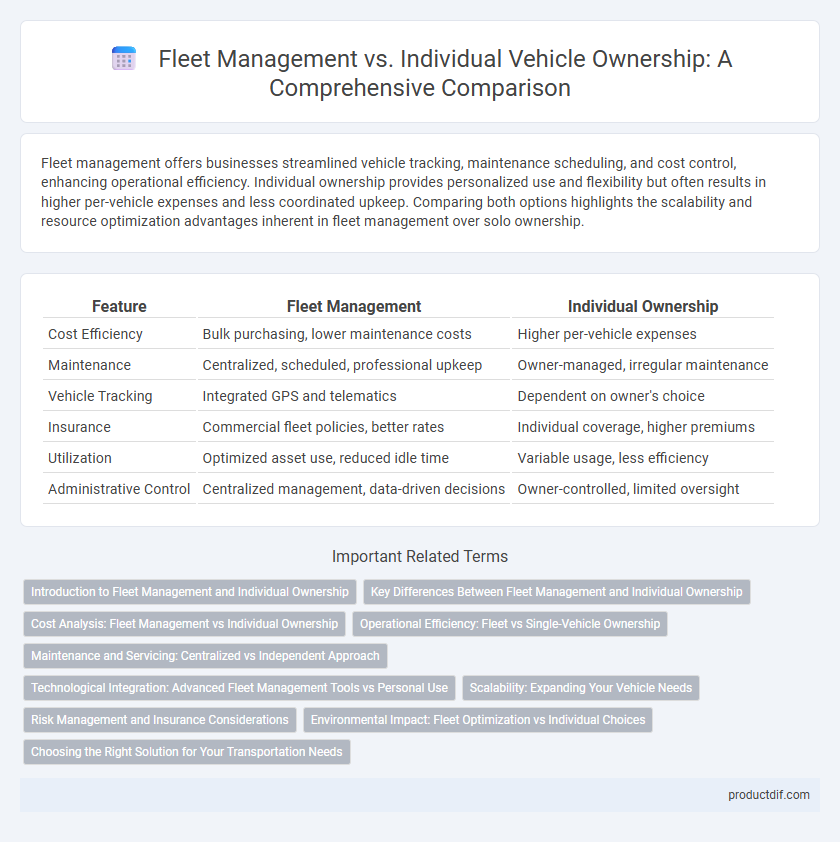Fleet management offers businesses streamlined vehicle tracking, maintenance scheduling, and cost control, enhancing operational efficiency. Individual ownership provides personalized use and flexibility but often results in higher per-vehicle expenses and less coordinated upkeep. Comparing both options highlights the scalability and resource optimization advantages inherent in fleet management over solo ownership.
Table of Comparison
| Feature | Fleet Management | Individual Ownership |
|---|---|---|
| Cost Efficiency | Bulk purchasing, lower maintenance costs | Higher per-vehicle expenses |
| Maintenance | Centralized, scheduled, professional upkeep | Owner-managed, irregular maintenance |
| Vehicle Tracking | Integrated GPS and telematics | Dependent on owner's choice |
| Insurance | Commercial fleet policies, better rates | Individual coverage, higher premiums |
| Utilization | Optimized asset use, reduced idle time | Variable usage, less efficiency |
| Administrative Control | Centralized management, data-driven decisions | Owner-controlled, limited oversight |
Introduction to Fleet Management and Individual Ownership
Fleet management involves overseeing a group of vehicles used for business purposes, focusing on optimizing efficiency, maintenance, and costs through centralized control and telematics technology. Individual vehicle ownership centers on personal use, where the owner is responsible for all aspects including purchase, maintenance, and insurance, prioritizing convenience and personal preference. Comparing these approaches highlights how fleet management leverages scale and data for operational advantages, while individual ownership offers autonomy and personalized usage.
Key Differences Between Fleet Management and Individual Ownership
Fleet management involves overseeing multiple vehicles to optimize operational efficiency, reduce costs, and ensure regulatory compliance, while individual ownership centers on personal vehicle use with full responsibility for maintenance and expenses. Key differences include scale of operation, with fleet management leveraging centralized control and asset tracking technologies versus the personalized decision-making and limited administrative oversight found in individual ownership. Fleet management often benefits from bulk purchasing, standardized maintenance schedules, and professional driver management, contrasting with the autonomous and flexible nature of individual vehicle ownership.
Cost Analysis: Fleet Management vs Individual Ownership
Fleet management reduces vehicle acquisition and maintenance costs through bulk purchasing discounts and centralized servicing, leading to lower total cost of ownership compared to individual ownership. Fleet operators benefit from optimized fuel consumption via route planning and telematics, which individual vehicle owners rarely utilize effectively. Insurance premiums are often cheaper for fleets due to negotiated group rates, whereas individual owners typically face higher personalized insurance expenses.
Operational Efficiency: Fleet vs Single-Vehicle Ownership
Fleet management significantly enhances operational efficiency through centralized maintenance schedules, bulk fuel purchasing, and optimized route planning, reducing downtime and costs. Individual vehicle ownership often results in higher per-vehicle expenses and less coordinated service intervals, impacting overall productivity. Leveraging telematics and data analytics, fleet operations achieve superior resource allocation and real-time performance monitoring.
Maintenance and Servicing: Centralized vs Independent Approach
Fleet management employs a centralized maintenance system that schedules regular servicing, reduces downtime, and ensures consistent vehicle performance across all units. Individual ownership relies on an independent approach, where owners manage servicing based on personal schedules and preferences, potentially leading to variable maintenance quality. Centralized fleet maintenance leverages data analytics and professional oversight to optimize repair costs and extend vehicle lifespan.
Technological Integration: Advanced Fleet Management Tools vs Personal Use
Advanced fleet management tools utilize real-time GPS tracking, predictive maintenance algorithms, and centralized data analytics to optimize vehicle usage and reduce operational costs across large fleets. Individual ownership typically relies on basic telematics and mobile apps for personal convenience rather than comprehensive efficiency improvements. Fleet technologies integrate AI-driven route optimization and automated compliance monitoring, delivering significant benefits over personal use systems limited to navigation and fuel tracking.
Scalability: Expanding Your Vehicle Needs
Fleet management offers unmatched scalability, enabling businesses to efficiently expand their vehicle inventory based on operational demand and growth projections. Individual ownership limits capacity to a fixed number of vehicles, often resulting in higher per-vehicle costs and logistical challenges. Fleet management systems integrate telematics, maintenance scheduling, and centralized asset tracking, streamlining scalability and reducing downtime during expansion phases.
Risk Management and Insurance Considerations
Fleet management optimizes risk mitigation through centralized monitoring, leveraging telematics and driver behavior analytics to reduce accidents and insurance claims. In contrast, individual ownership involves personalized risk factors, often resulting in higher insurance premiums due to diverse usage patterns and limited data. Effective fleet insurance policies bundle coverage, promote cost savings, and enhance claim handling efficiency compared to individual vehicle insurance plans.
Environmental Impact: Fleet Optimization vs Individual Choices
Fleet management enables optimized route planning and vehicle utilization, significantly reducing overall emissions through coordinated efforts and data-driven decisions. Individual ownership often leads to higher per-vehicle carbon footprints due to less efficient usage patterns and limited access to shared resources. Fleet optimization leverages technologies like telematics and predictive maintenance, minimizing fuel consumption and environmental impact compared to solitary driving habits.
Choosing the Right Solution for Your Transportation Needs
Fleet management offers centralized control, cost savings, and optimized utilization for businesses requiring multiple vehicles, while individual ownership provides flexibility and personal convenience for single users. Evaluating factors such as usage frequency, maintenance responsibilities, and financial goals helps determine the best option between fleet management services and personal vehicle ownership. Aligning transportation needs with operational objectives ensures efficient mobility solutions tailored to either business scalability or individual lifestyle preferences.
Fleet Management vs Individual Ownership Infographic

 productdif.com
productdif.com